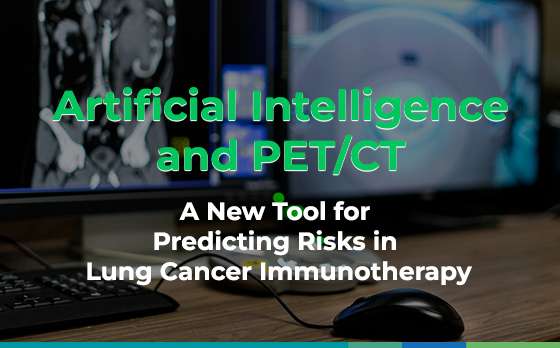Immunotherapy has revolutionized lung cancer treatment, improving survival rates through therapies with immunomodulatory drugs, such as immune checkpoint inhibitors (ICIs). However, this therapeutic approach also carries risks, such as interstitial lung disease induced by immunotherapy (ICI-ILD), a potentially fatal complication characterized by pulmonary fibrosis and respiratory failure, accounting for 35% of deaths due to immune-related adverse events (irAEs). A recent study led by Dr. Satoshi Watanabe and his team at Niigata University, published in *Academic Radiology*, explores how PET/CT imaging analysis using artificial intelligence (AI) can predict the occurrence of this complication.
Fluorodeoxyglucose positron emission tomography/computed tomography (FDG-PET/CT) is the standard method for routine staging before lung cancer treatment. Since FDG accumulates not only in cancerous tissues but also in inflamed areas, recent studies have demonstrated its usefulness in diagnosing and managing pulmonary inflammation. Based on this, the researchers hypothesized that FDG-PET/CT could assess pre-existing lung inflammation and predict the development of ICI-ILD, considering that this complication arises when inflammatory cells activated by immunotherapy attack not only cancer cells but also healthy tissues.

Figure 1. Interstitial Lung Disease Induced by Immune Checkpoint Inhibitors (ICI-ILD)** caused by collateral damage from the immune response to the presence of the tumor (Left). General description of the potential of Fluorodeoxyglucose Positron Emission Tomography/Computed Tomography (FDG-PET/CT) as a diagnostic technique for predisposition to ICI-ILD (Right).
Dr. Watanabe’s team conducted a retrospective analysis of 165 patients with primary lung cancer treated with ICIs at the Niigata University Medical and Dental Hospital. Using PET/CT images, the researchers analyzed FDG uptake in noncancerous (healthy) lungs through AI tools that excluded metastatic and adjacent regions irrelevant to the study. Higher FDG uptake indicated greater inflammation and, consequently, a more reactive immune system—detrimental in this context.
The analysis revealed that patients with elevated inflammation levels in noncancerous lungs had a 6.5-fold higher risk of developing ICI-ILD compared to those with lower inflammation levels. This finding has significant clinical implications, as it could enable physicians to identify high-risk patients before starting ICI treatment, allowing for alternative therapeutic strategies or closer monitoring.
Although PET/CT is primarily used to evaluate tumor progression and metastases, this study highlights its potential as a tool to estimate the risks associated with immunotherapy’s adverse effects. Moreover, these findings could contribute to a better understanding of the mechanisms underlying ICI-ILD, paving the way for future multicenter studies to validate and expand these results.
Main Reference:
Yamazaki, M., Watanabe, S., Tominaga, M., Yagi, T., Goto, Y., Yanagimura, N., Arita, M., Ohtsubo, A., Tanaka, T., Nozaki, K., Saida, Y., Kondo, R., Kikuchi, T., & Ishikawa, H. (2024). 18F-FDG-PET/CT uptake by noncancerous lung as a predictor of interstitial lung disease induced by immune checkpoint inhibitors. Academic Radiology. https://doi.org/10.1016/j.acra.2024.08.043
Other references
Reck, M., Rodríguez-Abreu, D., Robinson, A. G., Hui, R., Csőszi, T., Fülöp, A., Gottfried, M., Peled, N., Tafreshi, A., Cuffe, S., O’Brien, M., Rao, S., Hotta, K., Leiby, M. A., Lubiniecki, G. M., Shentu, Y., Rangwala, R., Brahmer, J. R., & KEYNOTE-024 Investigators (2016). Pembrolizumab versus Chemotherapy for PD-L1-Positive Non-Small-Cell Lung Cancer. The New England journal of medicine, 375(19), 1823–1833. https://doi.org/10.1056/NEJMoa1606774
Socinski, M. A., Jotte, R. M., Cappuzzo, F., Orlandi, F., Stroyakovskiy, D., Nogami, N., Rodríguez-Abreu, D., Moro-Sibilot, D., Thomas, C. A., Barlesi, F., Finley, G., Kelsch, C., Lee, A., Coleman, S., Deng, Y., Shen, Y., Kowanetz, M., Lopez-Chavez, A., Sandler, A., Reck, M., … IMpower150 Study Group (2018). Atezolizumab for First-Line Treatment of Metastatic Nonsquamous NSCLC. The New England journal of medicine, 378(24), 2288–2301. https://doi.org/10.1056/NEJMoa1716948
Horn, L., Mansfield, A. S., Szczęsna, A., Havel, L., Krzakowski, M., Hochmair, M. J., Huemer, F., Losonczy, G., Johnson, M. L., Nishio, M., Reck, M., Mok, T., Lam, S., Shames, D. S., Liu, J., Ding, B., Lopez-Chavez, A., Kabbinavar, F., Lin, W., Sandler, A., … IMpower133 Study Group (2018). First-Line Atezolizumab plus Chemotherapy in Extensive-Stage Small-Cell Lung Cancer. The New England journal of medicine, 379(23), 2220–2229. https://doi.org/10.1056/NEJMoa1809064
Paz-Ares, L., Luft, A., Vicente, D., Tafreshi, A., Gümüş, M., Mazières, J., Hermes, B., Çay Şenler, F., Csőszi, T., Fülöp, A., Rodríguez-Cid, J., Wilson, J., Sugawara, S., Kato, T., Lee, K. H., Cheng, Y., Novello, S., Halmos, B., Li, X., Lubiniecki, G. M., … KEYNOTE-407 Investigators (2018). Pembrolizumab plus Chemotherapy for Squamous Non-Small-Cell Lung Cancer. The New England journal of medicine, 379(21), 2040–2051. https://doi.org/10.1056/NEJMoa1810865


